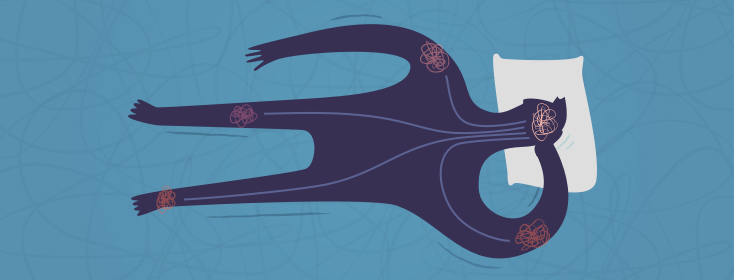What's the Link Between Pain and Depression?
Pain and depression are such fascinating things.
Pain is subjective. Depression is subjective. There is really no way to quantify either one. Yes, we have “scales” and “questions” but there really is no blanket way to describe or measure them in my opinion. We look at inflammation in the blood. We look at deformed joints on X-rays and bright colors on an ultrasound, but even with all of that what one person feels as extreme pain might be the mild annoyance of another.
Pain is experienced differently when it becomes chronic
Then when you throw in the chronic pain of psoriatic arthritis, varying pain levels take on a whole new meaning. On top of that, we begin to define “pain” differently. I’ve noticed, for example, that my overall tolerance for pain has reached a much higher level. The pain level that bothered me enough to seek medical treatment years ago is the same pain level that I consider “good” today.
What came first? Pain or depression?
There are so many things that contribute to what we define as pain. Overworking, not enough sleep, weather, disease activity, all these things can contribute to our overall pain levels. But what about our mental health? Do you find that when you are anxious, sad, or depressed that your overall pain levels are higher? Does our mental state contribute to our perception of pain? Or is the reverse true? Do we become depressed or anxious when our overall pain levels are higher? It’s the classic question of which came first, the chicken or the egg.
There is a clear link
Regardless of which came first, we know (and science has proven) that there is a direct link between our overall mental health and our physical pain levels. Now, I don’t claim to know the science behind all of it (after all, science has never been my strong suit), but I do know that I’ve experienced that connection myself.
How we rate our pain
When I am feeling down, anxious, or sad, I tend to always rate my physical pain levels as higher. If I’m feeling upbeat or happy, I tend to rate my pain at least 1-2 points lower even though I have no way of knowing if the exact levels of the pain are the same or not. But, my perception of the pain is different.
Therefore, I believe it is imperative that we take steps to protect our mental health so that we have a direct way to manage at least one contributing factor of our physical pain. We can’t control the weather or the stress that everyday life takes on our bodies. But we can make conscious choices to manage our emotional health and therefore our physical pain as well.
Pain and depression even share a common remedy
I was surprised to learn from my doctor that there are actually some medications officially labeled as antidepressants that are also often also used to manage physical pain. At first I questioned it. It seemed odd to me. Of course, I went home a headed straight to “Dr. Google” where I, of course, learned that my doctor was right. In fact, according to the Mayo Clinic, many antidepressants are commonly prescribed to treat pain, even when depression isn’t a factor.
Understanding and accepting the link between pain and depression is vital to living well with psoriatic arthritis. To think that you could separate one from the other underestimates the vast power that the human brain has on the rest of the body. Make sure that when you are trying to manage your physical pain, you don’t neglect to manage your emotional pain too. It might help you manage your PsA pain more than you realize.

Join the conversation